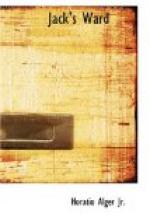“Yes,” gasped Jack, nearly choking, “that’s it exactly. It isn’t your death we’re laughing at, but your face.”
“My face!” exclaimed the insulted spinster. “One would think I was a fright by the way you laugh at it.”
“So you are!” said Jack, with a fresh burst of laughter.
“To be called a fright to my face!” shrieked Rachel, “by my own nephew! This is too much. Timothy, I leave your house forever.”
The excited maiden seized her hood; which was hanging from a nail, and was about to leave the house when she was arrested in her progress toward the door by the cooper, who stifled his laughter sufficiently to say: “Before you go, Rachel, just look in the glass.”
Mechanically his sister did look, and her horrified eyes rested upon a face streaked with inky spots and lines seaming it in every direction.
In her first confusion Rachel jumped to the conclusion that she had been suddenly stricken by the plague. Accordingly she began to wring her hands in an excess of terror, and exclaimed in tones of piercing anguish:
“It is the fatal plague spot! I am marked for the tomb. The sands of my life are fast running out.”
This convulsed Jack afresh with merriment, so that an observer might, not without reason, have imagined him to be in imminent danger of suffocation.
“You’ll kill me, Aunt Rachel! I know you will,” he gasped.
“You may order my coffin, Timothy,” said Rachel, in a sepulchral voice; “I shan’t live twenty-four hours. I’ve felt it coming on for a week past. I forgive you for all your ill-treatment. I should like to have some one go for the doctor, though I know I’m past help.”
“I think,” said the cooper, trying to look sober, “you will find the cold-water treatment efficacious in removing the plague spots, as you call them.”
Rachel turned toward him with a puzzled look. Then, as her eyes rested for the first time upon the handkerchief she had used, its appearance at once suggested a clew by which she was enabled to account for her own.
Somewhat ashamed of the emotion which she had betrayed, as well as the ridiculous figure which she had cut, she left the room abruptly, and did not make her appearance again till the next morning.
After this little episode, the conversation turned upon Jack’s approaching journey.
“I don’t know,” said his mother, “but Rachel is right. Perhaps Jack isn’t old enough, and hasn’t had sufficient experience to undertake such a mission.”
“Now, mother,” expostulated Jack, “you ain’t going to side against me, are you?”
“There is no better plan,” said his father, quietly.
CHAPTER XXII
THE FLOWER GIRL
Henry Bowen was a young artist of moderate talent, who had abandoned the farm on which he had labored as a boy, for the sake of pursuing his favorite profession. He was not competent to achieve the highest success. But he had good taste and a skillful hand, and his productions were pleasing and popular. He had formed a connection with a publisher of prints and engravings, who had thrown considerable work in his way.




